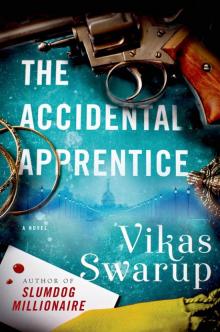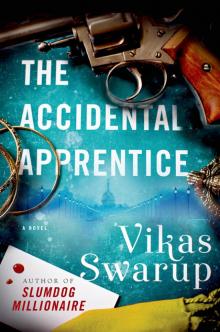- Home
- Vikas Swarup
Q & A Page 8
Q & A Read online
Page 8
Many of these boys were ‘repeaters’, which meant that they had been returned to the Juvenile Home even after someone had taken custody of them from the Juvenile Welfare Board. Munna returned after being ill-treated by his stepmother. Jashim was hounded out by his cruel brother. Pawan returned because the relative he was restored to put him to work in a seedy motel and the police caught him. Despite such experiences, many boys still pined to be ‘restored’, ready to exchange a known hell for an unknown one.
Without even trying, I became their leader. Not because I was bigger, not because I was more aggressive, but because I spoke English. I was the orphan boy who could speak and read the magic language, and its effect on the officials was electric. The head warden would ask how I was doing from time to time. The sports teacher allowed me to set up a makeshift cricket pitch in the front courtyard, where we got in four or five decent games before Munna broke the warden’s window and all sports were banned. The stern cook occasionally obliged me with a second helping. Gupta never called me to his room at night. And the doctor instantly put me in the isolation ward without the usual delay, thereby preventing me from infecting the whole dormitory.
I had been enjoying my exclusive stay in the isolation ward for over two weeks when another bed was moved into the room. A new boy had arrived, I was told, in a very bad condition. He was brought in on a stretcher in the afternoon, wearing a torn orange vest, stained and scuffed shorts, and a yellow tabeez around his neck. And that was my first meeting with Salim Ilyasi.
Salim is everything that I am not. He has a wheatish complexion and a cherubic face. He has curly black hair and when he smiles his cheeks dimple. Though he is only seven years old, he has a keen, questioning mind. He tells me his story in short, halting sentences.
He comes from a very poor family, which used to live in a village in Bihar. The village was mostly made up of poor peasants, but there were also a few rich landowners. It was predominantly Hindu, but there were a couple of Muslim families too, like Salim’s. His father was a labourer, his mother a housewife, his elder brother worked in a tea stall. Salim himself attended the village school. They lived in a small thatched hut at the edge of the zamindar’s compound.
Last week, in the cold and frosty month of January, an incident took place in the village’s Hanuman temple. Someone broke into the sanctum sanctorum at night and desecrated the idol of the monkey god. The temple’s priest claimed he saw some Muslim youths lurking near the grounds. Bas, that was it! The moment the Hindus heard this they went on a rampage. Armed with machetes and pickaxes, sticks and torches, they raided the homes of all the Muslim families. Salim was playing outside the hut and his father, mother and brother were having tea inside when the mob attacked. Before his very eyes, they set fire to the hut. He heard his mother’s shrieks, his father’s cries, his brother’s wails, but the mob would not allow anyone to escape. His whole family was burnt to death in the inferno. Salim ran to the railway station and jumped on to the first train he saw. It took him to Delhi with no food, no clothes and not one familiar face. He lay on the platform for two days, cold and hungry, delirious with fever and grief, before a constable discovered him and sent him to the Juvenile Home.
Salim says he has bad dreams at night. He hears the sounds of the mob. His mother’s shrieks echo in his ears. He shudders when he visualizes his brother writhing in the flames. He says he has begun to hate and fear all Hindus. He asks my name.
‘Mohammad,’ I tell him.
Over time, Salim and I become very good friends. We have many things in common. We are both orphans, with no hope of being ‘restored’. We both love playing marbles. And we both love watching films. I use my influence to get him a bed next to mine when we move back to the dormitory.
Late one night, Salim is summoned to Gupta’s room. Gupta is a widower and lives alone on the compound. Salim is worried. ‘Why is he calling me?’ he asks me.
‘I don’t know,’ I reply. ‘I’ve never been to his room. But we can find out today.’
So Salim walks down to Gupta’s room and I tiptoe behind him.
Gupta is sitting in his room wearing crumpled kurta pyjamas when Salim knocks on the door. ‘Come . . . come, Salim,’ he says in a slurred voice. He has a glassful of golden liquid in his hand. He gulps it down and wipes his mouth. His eyes look like big buttons. I watch from the little space between the two curtains in the doorway. He strokes Salim’s face, tracing his fingers over his bony nose and thin lips. Then abruptly he orders, ‘Take off your shorts.’
Salim is confused by this request.
‘Just do as I say, bastard, or I will give you a tight slap,’ Gupta snarls.
Salim complies. He pushes down his shorts hesitatingly. I avert my eyes.
Gupta approaches Salim from behind, his gold chains jangling. ‘Good,’ he mutters. I see him unfasten the cord of his pyjamas and lower them. I can see his hairy backside. Salim has still not understood what is happening, but a fog is lifting from my brain. With startling clarity I suddenly comprehend what had happened in Father John’s room that night. And what had followed the next day.
I let out a piercing scream that shatters the silence of the night like a bullet. It wakes up the boys sleeping peacefully in the dormitories; it wakes up the cook, snoring in the kitchen; it wakes up the warden in his bedroom; it even wakes up the stray dogs, which begin to bark madly.
Gupta doesn’t know what has hit him. He hastily pulls up his pyjamas and tries to shoo Salim away. But the cook, the warden and the guards are already on their way to Gupta’s room. They discover his dirty secret that night (though they do nothing about it). But Gupta also discovers me lurking behind the curtains. From then on he becomes my mortal enemy. Salim is shaken, but unhurt. He had given up his animus against Hindus a long time ago. But a fear of abuse is embedded in him for the rest of his life.
It is a beautiful spring day. And it appears even more beautiful because we are outside the confines of the Juvenile Home. We have all been taken on a day trip by an international NGO. We travel by air-conditioned bus all over Delhi. We have lunch in the zoo and see the animals. For the first time we see a hippopotamus and kangaroos and giraffes and the giant sloth. We see pelicans and flamingos and the duck-billed platypus. Then we are taken to the Qutub Minar, the highest tower in India. Laughing and jostling, we climb the stairs and peer out from the first-floor balcony. The men and women on the ground seem like ants. We shout ‘Hooooo’ and listen for the sound to peter out before it reaches the ground. Finally, we are taken to India Gate to see a big carnival. We are each given ten rupees to spend on any attraction we choose. I want to ride on the giant wheel, but Salim tugs at my sleeve and pulls me to another booth. ‘Pandit Ramashankar Shastri,’ it says. ‘World-famous Palmist. Only Rs.10 per reading.’ An old man is sitting inside the booth, wearing a dhoti kurta. He has a white moustache, a vermilion tilak on his forehead, and thick lenses. A black choti juts out from the back of his head.
‘I want to show my hand,’ Salim says. ‘It is only ten rupees.’
‘Don’t be foolish,’ I tell him. ‘These chaps are conmen. They cannot know your future. And, in any case, there’s not much in our future worth knowing.’
‘I want to show my hand just the same.’ Salim is adamant.
‘Fine.’ I give in. ‘You go ahead, but I’m not spending my ten rupees on this crap.’
Salim pays the money and eagerly extends his left hand. The pandit shakes his head. ‘No, not the left hand. That is for girls. Boys have to show their right hand.’
Salim quickly extends his right palm. The palmist peers at it with a magnifying glass, and analyses the scrabbly lines as if they were a map of buried treasure. Finally he puts down the magnifying glass and lets out a satisfied sigh. ‘You have a remarkable hand, my boy. I have never seen a better fate line. I see a very bright future for you.’
‘Really?’ Salim is delighted. ‘What will I become?’
Mr Shastri has obviously not thought about tha
t. He closes his eyes for ten seconds, then opens them. ‘You have a beautiful face. You will be a very famous actor,’ he declares.
‘Like Armaan Ali?’ squeals Salim.
‘Even more famous,’ says the pandit. He turns to me. ‘Do you also want to show your hand? It is only ten rupees.’
‘No, thank you,’ I say and begin to move away, but Salim bars my way.
‘No, Mohammad, you have to show your hand. For my sake, please.’
With a resigned look, I fork out my ten rupees and extend my right hand.
The pandit scowls at me as he adjusts his thick glasses and examines my palm. He pores over it for more than five minutes. He makes some notes, does some calculations.
‘What’s the matter?’ Salim asks, alarmed.
The palmist frowns slightly and shakes his head. ‘The line of head is strong, but the line of heart is weak. And, most importantly, the line of life is short. The stars do not seem to be right. The alignment of the planets is inauspicious. The Mount of Jupiter is good, but the Mount of Saturn cancels it out. There are obstacles and pitfalls. I can do something to ease your way, but it will cost you.’
‘How much?’
‘Around two hundred rupees. Why don’t you ask your father? Isn’t he the one who owns the big bus?’
I laugh. ‘Ha! Panditji, before spinning this yarn about my future, you should have checked out who we really are. We are not rich kids. We are orphans from the Delhi Juvenile Home in Turkman Gate and this bus doesn’t even belong to us. Still, you conned us into parting with twenty rupees.’ I pull Salim. ‘Come, let’s go. We have wasted enough time here.’
As we are walking away, the palmist calls me. ‘Listen! I want to give you something.’
I return to the booth. The pandit gives me an old one-rupee coin.
‘What’s this, Panditji?’
‘It’s a lucky coin. Keep it. You will need it.’
I hold it in my fist.
Salim wants an ice cream, but we have just one rupee and that won’t buy us anything. We watch the other kids enjoying their rides. I flip the coin aimlessly and it slips out of my fingers and rolls underneath a bench. I bend down to pick it up. It has come up heads. Next to it lies a ten-rupee note, dropped by someone. Like Magic. Salim and I buy ice creams. I slip the coin carefully into my pocket. It is indeed my lucky charm.
Salim is sad that my future has not turned out to be as bright as his, but he is also excited about becoming a film star. In front of us is a huge billboard of a new film. In lurid colours, it shows the hero with a gun in his hands, blood on his chest and a black bandanna around his head; a villain wearing a twisted grin; a heroine with big breasts. Salim stares at it, transfixed.
‘What are you looking at, Salim?’ I ask.
‘I am trying to see if the black headband will suit me,’ he replies.
We are sitting in class, but Mr Joshi, our portly teacher who specializes in burping and picking his nose, is not teaching. He is reading a novel, which is carefully hidden inside the textbook he holds in his hands. We pass the time making paper aeroplanes, etching patterns on the wooden desks and dozing. Suddenly Munna, who has been instructed to monitor the corridor, comes running in. ‘Masterji, Masterji,’ he says breathlessly, ‘Warden Sahib is coming.’
Mr Joshi lets out a loud burp and quickly jettisons his novel. He snaps his fingers and stands up. ‘OK boys, so what were we discussing? Yes. You were all telling me what you want to become when you grow up. Who wants to go next?’
Salim puts up his hand. The first time he has ever done this.
‘Yes, Salim, what do you want to become?’
‘I will become a famous actor, Masterji. An astrologer has told me,’ he says triumphantly.
The class squeals with laughter.
There are two versions of who the big man is. Some say that he is a very rich diamond merchant with no offspring of his own. So from time to time he comes to the Juvenile Home to adopt children, who are then taken to his palatial home in Mumbai. Others say that he actually owns a school in Mumbai, where he takes children he finds promising for proper training. Either way, one thing is clear. If you are selected by Sethji, your life is made.
Salim doesn’t care whether Sethji is a diamond merchant or a school owner. He is mainly concerned with the fact that the big man is from Mumbai – the centre of the film industry. He is convinced that Sethji has come to pluck him from here and take him to the glittering world of Bollywood. It is his destiny. The palmist’s prediction is going to come true.
We are all lined up in the mess hall for an inspection by Sethji. Salim has taken a bath. Actually, he has taken three baths, scrubbing himself again and again to remove every trace of dirt. He has put on his best clothes. His hair is nicely combed. He is the most presentable boy in the Home. But I fret at his desperation. If he is not selected, he will be shattered.
Sethji finally arrives, accompanied by two other men. He doesn’t look like a diamond merchant. He looks more like a gangster. But then, we’ve never seen a diamond merchant. Perhaps they look like gangsters. He is very swarthy and has a thick black moustache, like the dacoit Veerappan’s. He wears a white bandgala suit. A long, thick gold chain dangles down from his neck to his second button. His fingers are loaded with rings with different coloured gems. Some red, some green, some blue. The two henchmen with him look exactly like henchmen. I learn later that they are called Mustafa and Punnoose. Gupta is also with them, leading the way. His two gold chains look modest in comparison with Sethji’s.
‘Sethji, you seem to have forgotten us, coming after such a long time. Many new boys have arrived since your last visit. I am sure you will find many to your liking,’ Gupta tells him.
The inspection begins. All of us put on our best smiles. Sethji goes over each boy, appraising him from head to toe. I don’t know what he is looking for, because he does not ask us any questions, just looks at our faces. He completes one round of inspection. He does not even glance at me twice. Then he goes over the line once again. When he comes to Salim, he stops.
‘What is your name?’ he asks in a heavy South Indian accent.
‘S . . . Salim Ilyasi,’ Salim stammers in his excitement.
‘When did he arrive?’ he asks Gupta.
‘About eleven months ago, from Chhapra in Bihar.’
‘How old is he?’
‘Eight.’
‘Does he have anyone?’
‘No, Sethji. His whole family died in a communal disturbance.’
‘How sad,’ says Sethji. ‘But he is just the kind of boy I need. Can you sort out the paperwork?’
‘You just have to tell me, Sethji. Whoever you want will be restored to you in no time. For this boy, we’ll show Mustafa as the uncle. The Welfare Board will not create any problems. In fact, they want to get rid of as many kids as possible.’
‘Fine. For this visit, let’s settle on just this one kid.’
Gupta looks at Salim, and then he looks at me, standing next to Salim. ‘What about him?’ He points at me.
Sethji looks me in the eye, and shakes his head. ‘He is too old.’
‘No, Sethji, he is only ten. Name is Thomas, speaks perfect English.’
‘Makes no difference to me. I don’t need him. I want the other one.’
‘They are thick as thieves, these two. If you take Salim, you have to take Thomas as well.’
Sethji gets annoyed. ‘I’ve told you, Gupta, that I don’t want any Thomas Womas. I am only taking one boy and that is Salim.’
‘I am sorry, Sethji, but I insist. If you take Salim, you will have to take Thomas. It is a package deal.’
‘Package deal?’
‘Yes. Buy one, get one free. I won’t charge you for Thomas.’ Gupta grins, displaying his paan-stained teeth.
Sethji goes into a huddle with his henchmen.
‘OK,’ he tells Gupta. ‘Prepare the papers for these two. I’ll collect them on Monday.’
Salim rushes into my arms.
He is on top of the world. That night, he doesn’t sleep from sheer excitement. He has celluloid dreams of life in Mumbai. Of golden sunsets on Marine Drive with Amitabh and rose-coloured dawns on Chowpatty with Shahrukh. I don’t sleep that night either. I toss and turn in my bed. But I don’t dream of stardom and paradise. I dream that I am a hawker on the pavement, selling fruits. A dark swarthy man bends down to buy some mangoes from me. I see his gold chain dangling. He tosses me some change. I put a nice juicy mango in his bag, and then quietly slip in a rotten banana. For free.
The train journey to Mumbai is uneventful. Salim and I travel in the second-class sleeper compartment with the henchmen Mustafa and Punnoose. Sethji, we are told, has gone ahead by plane. Mustafa and Punnoose wear lungis, smoke beedis and sleep most of the time. They tell us very little about Sethji. They say his real name is Babu Pillai, but everybody calls him Maman, meaning ‘Uncle’ in the Malayalam language. He is originally from Kollam in Kerala, but has been settled in Mumbai for a long time. He is a very kind man, who runs a school for disabled kids, helping them rebuild their lives. Maman believes that disabled children are closer to God. He rescues children from juvenile homes, which he believes are nothing but jails under another name. If Maman had not saved us, we would have ended up cleaning car windscreens at traffic lights or sweeping floors in private houses. Now we would be taught useful skills and groomed for success. Mustafa and Punnoose are excellent salesmen. By the end of the trip, even I am convinced that being picked by Maman is the best thing that has ever happened to me and that my life will now be transformed.
From time to time, the train passes through slum colonies, lining the edges of the railway tracks like a ribbon of dirt. We see half-naked children with distended bellies waving at us, while their mothers wash utensils in sewer water. We wave back.
The sights and sounds of Mumbai overwhelm us. Churchgate station looks exactly as it did in Love in Bombay. Salim half expects to bump into Govinda singing a song near the church. Mustafa points out the beach at Marine Drive. I am fascinated by my first sight of the ocean, where giant waves crash and roll against the rocks. Salim doesn’t see the majestic ocean. He looks at the stalls selling soft drinks and snacks. ‘That is where Govinda and Raveena had bhel puri,’ he points out excitedly. We pass through Haji Ali’s dargah. Salim raises his hands to Allah when he sees the shrine, exactly like he saw Amitabh Bachchan do in the film Coolie. We pass through the districts of Worli, Dadar and Mahim, Mustafa and Punnoose pointing out major landmarks to us. At Mahim Fort, Salim gestures the taxi driver to stop.

 The Accidental Apprentice: A Novel
The Accidental Apprentice: A Novel Six Suspects
Six Suspects Q & A
Q & A The Accidental Apprentice
The Accidental Apprentice